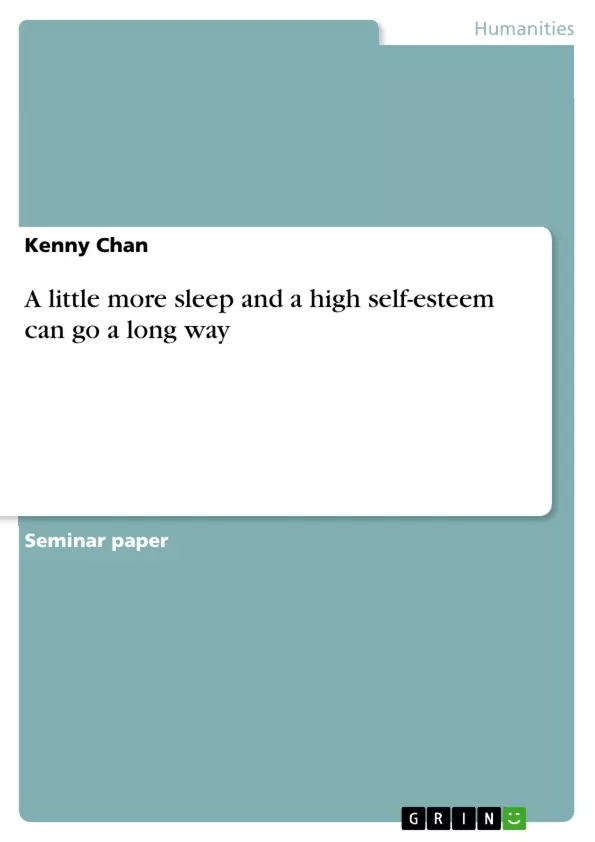This will be a description of how a study could be carried out that gains insight and examines how sleep and self-esteem can impact your academic performance. The participants for this study will be children 15 - 17 years old who will be taking the Math and English MCAS for the first time. The participants will then be divided up into two groups, one with a sense of low self-esteem and another with a sense of high self-esteem. The group with low self-esteem will be further divided into two groups, one with less sleep and the other with more sleep. The group with high self-esteem will also be divided into two groups, again one with less sleep and the other with more sleep. The exam will be issued as if it were a real exam. Parents and participants will be told that the purpose of the experiment is about finding out the reasons to poor or high academic performance. At the end of the exams, parents and all participants will be debriefed in a room altogether.
Inhaltsverzeichnis (Table of Contents)
- Abstract
- A little more sleep and high self-esteem can go a long way
- Methods
Zielsetzung und Themenschwerpunkte (Objectives and Key Themes)
This study aims to investigate the impact of sleep and self-esteem on academic performance. The hypothesis is that students with higher self-esteem and more sleep will perform better on standardized tests.
- The relationship between sleep duration and academic performance
- The role of self-esteem in academic achievement
- The potential interplay of sleep and self-esteem on academic performance
- The use of self-esteem manipulation techniques in research
- The ethical considerations of manipulating self-esteem in research
Zusammenfassung der Kapitel (Chapter Summaries)
- Abstract: This section outlines the proposed study design and its objective to examine the impact of sleep and self-esteem on academic performance in high school students taking the MCAS exam.
- A little more sleep and high self-esteem can go a long way: This section provides a background for the study by reviewing existing research on the relationship between sleep, self-esteem, and academic performance. It highlights the need for further investigation into the potential interplay of these factors.
- Methods: This section details the methodology of the proposed study, including participant selection, data collection, and the manipulation of sleep and self-esteem variables.
Schlüsselwörter (Keywords)
The primary focus of this study is on the relationship between sleep, self-esteem, and academic performance. The study utilizes established methods of self-esteem manipulation and examines the impact of varying sleep durations on MCAS test scores. Key terms include: sleep deprivation, self-esteem manipulation, academic performance, MCAS, bogus performance feedback, and standardized testing.
Frequently Asked Questions
What is the main goal of this study?
The study investigates how sleep duration and self-esteem levels impact the academic performance of students taking standardized tests like the MCAS.
Who are the participants in this research?
The participants are children aged 15 to 17 who are taking the Math and English MCAS for the first time.
How is self-esteem categorized in the study?
Participants are divided into two main groups: those with low self-esteem and those with high self-esteem, based on specific research criteria.
How is sleep duration manipulated in the experiment?
Within each self-esteem group, students are further subdivided into groups that receive either "less sleep" or "more sleep" before the exam.
What ethical considerations are mentioned regarding self-esteem?
The study addresses the ethical implications of manipulating self-esteem variables and uses techniques like "bogus performance feedback" for research purposes.
- Citar trabajo
- Kenny Chan (Autor), 2011, A little more sleep and a high self-esteem can go a long way, Múnich, GRIN Verlag, https://www.grin.com/document/285039



